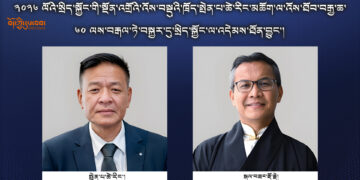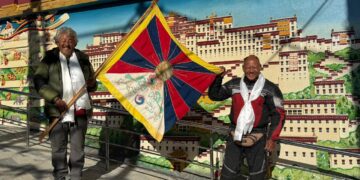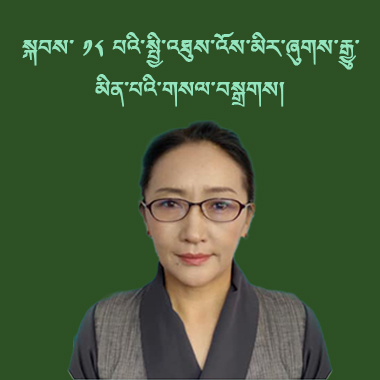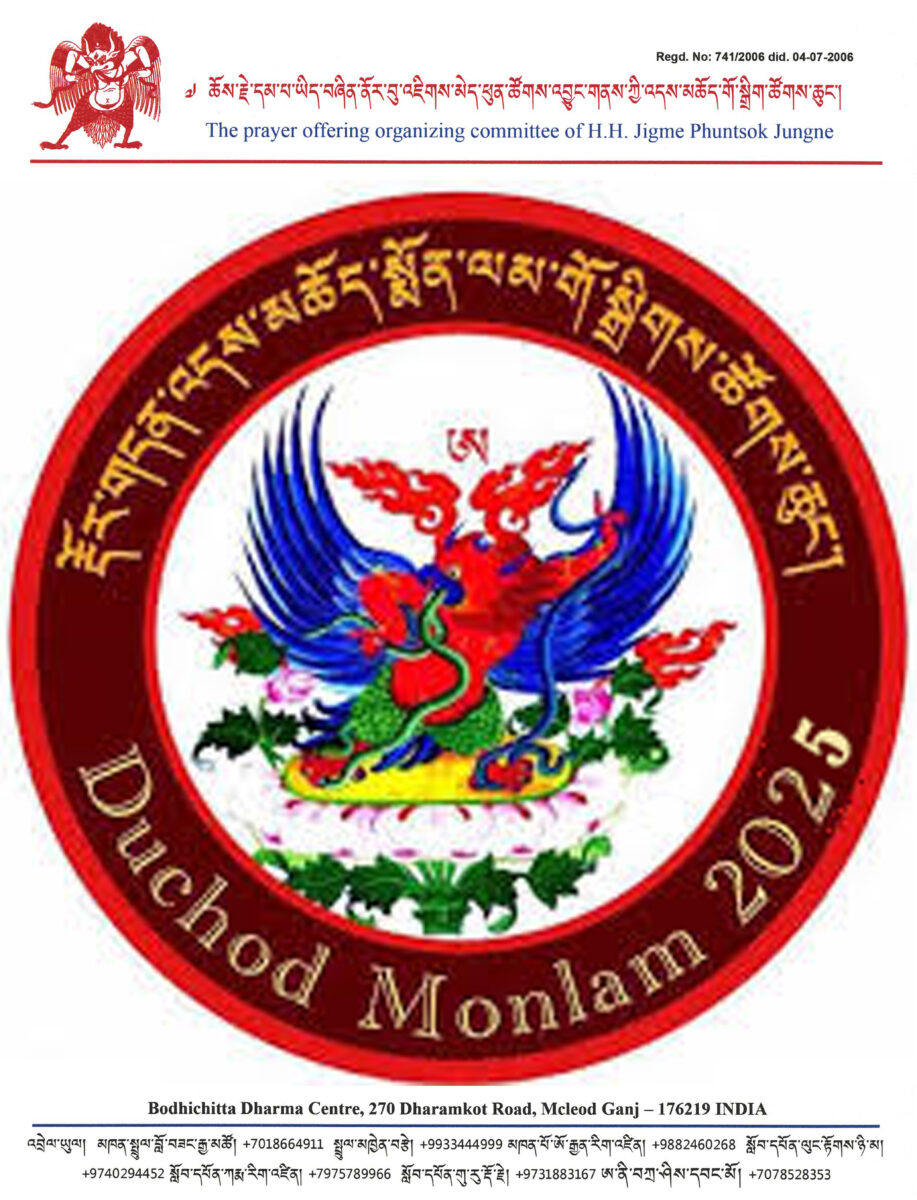ནི་ཁོ་ལ་སི་ ཌེ་ ཁེ་རི་སི་ཊོ་ཧྥུ། ལུང་རིགས་རྒྱལ་གྱིས་བསྒྱུར།
 གཟའ་པ་སངས་ཉིན་ཨོ་ལིམ་པིག་མཛད་སྒོ་འཚོགས་སྐབས། ཏཱ་ལའི་བླ་མ་དེར་མེད། ཁོང་ཕེབས་རྒྱུ་དེར་ཕྱོགས་གཉིས་ཀ་ནས་གཟབ་ནན་སྒོས་བལྟས་ཤིང་བསམ་ཚུལ་འདི་ཕན་ཚུན་ལ་ངོམ་རེས་བྱས། མཐའ་མ་དེར་ཕན་ཚུན་གྱི་དོགས་པ་ཆེན་པོ་དེར་རྩ་བ་ནས་གླགས་མ་ཁེལ།
གཟའ་པ་སངས་ཉིན་ཨོ་ལིམ་པིག་མཛད་སྒོ་འཚོགས་སྐབས། ཏཱ་ལའི་བླ་མ་དེར་མེད། ཁོང་ཕེབས་རྒྱུ་དེར་ཕྱོགས་གཉིས་ཀ་ནས་གཟབ་ནན་སྒོས་བལྟས་ཤིང་བསམ་ཚུལ་འདི་ཕན་ཚུན་ལ་ངོམ་རེས་བྱས། མཐའ་མ་དེར་ཕན་ཚུན་གྱི་དོགས་པ་ཆེན་པོ་དེར་རྩ་བ་ནས་གླགས་མ་ཁེལ།
ཨོ་ལིམ་པིག་དང་རྒྱ་ནག་གི་སྟོབས་ཤུགས་ལ་རྒོལ་བ། འབྱུང་འགྱུར་གྱི་ལོ་ཟླའི་ནང་ཇེ་སྡུག་ཏུ་འགྲོ་སྲིད་པའི་རྒྱ་ནག་གི་རྒྱལ་སྤྱིའི་སྣང་བརྙན་གཏོར་སྐྱོན་དང་བརྟན་ལྷིང་དཀྲོགས་གཞི་སོགས་གྲིབ་ནག་འདི་དག་གི་ཁྲོད་ཀྱི་གཙོ་བོ་ཞིག་ནི་བོད་རེད། འོན་ཀྱང་། འདི་ངེས་པར་དུ་ཡིན་དགོས་དོན་ཡོད་པ་མ་རེད།
ཕྱི་ཟླ་དྲུག་པའི་ནང་ངས་ཏཱ་ལའི་བླ་མ་མཆོག་ལ་སྒེར་གྱི་མཇལ་ཁ་ཞིག་ཞུས་ཤིང་། ཁོང་དང་རྒྱ་ནག་གིས་གྲོས་གཞི་གང་འདྲ་ཞིག་ལ་ངོས་ལེན་བྱེད་ཐུབ་པའི་སྐོར་ལ་བཀའ་མོལ་ལྷུག་པོར་ཞུས་པ་ཡིན། བོད་ཀྱི་གནད་དོན་སེལ་ཕྱོགས་ཐད་ཁོང་ནི་ཡོངས་ཁྱབ་བསྒྲགས་གཏམ་དག་ནས་ང་ལ་བསམ་ཚུལ་སྤྲད་པ་ལྟར་མིན་པར། ཧ་ཅང་གི་བསྟུན་མཁས་དང་ལག་ལེན་ལ་གཞོལ་མཁན་ཞིག་རེད། ཡིན་ནའང་ཁོང་གིས་རྒྱ་ནག་དང་མཉམ་དུ་འབྲེལ་བ་འཛིན་པའི་སྲིད་བྱུས་འདི་སླེབས་ས་ཞིག་ལ་བསླེབ་མིན་ཐད་ཐུགས་དོགས་གནང་གི་འདུག གལ་སྲིད་འབྲེལ་བ་མུ་མཐུད་དུ་འགག་ཚེ་ཁོང་གིས་རྒྱ་ནག་ལ་རེ་བ་རྒྱག་རྒྱུ་མཚམས་སྲིད་པ་ཞིག་ཆགས་འདུག
དེ་ནས་བཟུང་ངས་ ༼རྒྱ་ནག་གི་ལས་བྱེད་ཚོའི་མཉམ་དུ་བགྲོ་གླེང་བྱས་པ་བཞིན།༽ མུ་མཐུད་དེ་བོད་གཞུང་གི་ལས་བྱེད་ཚོ་མཉམ་དུ་བགྲོ་གླེང་བྱས་པ་ཡིན། རྒྱ་ནག་གིས་ཏཱ་ལའི་བླ་མར་སྔར་གྱི་ལངས་ཕྱོགས་རྙིང་བ་དག་མཁྲེགས་པོར་འཛིན་པ་དེ་ནི་ནོར་འཁྲུལ་རེད། ཏཱ་ལའི་བླ་མ་མཆོག་གིས་དུས་ཚོད་ནི་གཉན་འཕྲེང་གི་ཁ་ཐུག་ཅིག་ཡིན་པར་གཟིགས་ཀྱི་འདུག་ལ། ༡༩༧༢ ལོར་སྲིད་འཛིན་ རི་ཆར་ཌི་ ནི་ཁུ་སོན་པེ་ཅིན་ལ་མ་ཕེབས་གོང་དུ་ཁོང་གིས་པེ་ཅིན་ལ་ཨ་རི་དང་རྒྱ་ནག་གི་འབྲེལ་བར་བསྐྱར་དུ་བསམ་བློ་གཏོང་རྒྱུའི་གྲ་སྒྲིག་ཡོད་པའི་གོ་བརྡ་སྤྲད་པ་ལྟར། ཏཱ་ལའི་བླ་མས་ཀྱང་རྒྱ་ནག་མཉམ་དུ་གྲོས་མོལ་བྱེད་ཆོག་པའི་གོ་བརྡ་གཏོང་གི་འདུག
གོ་བརྡ་གཅིག་ནི་འདི་རེད། ཏཱ་ལའི་བླ་མ་མཆོག་གིས་ཐེངས་དང་པོར། ཁོང་གིས་གུང་ཁྲན་ཏང་གི་འོག་ཏུ་བོད་ནང་སྤྱི་ཚོགས་རིང་ལུགས་ཀྱི་ལམ་ལུགས་ངོས་ལེན་བྱེད་ཐུབ་པའི་གསལ་བསྒྲགས་སྤེལ་འདོད་ཡོད་ཅེས་གསུང་གི་འདུག འདི་ནི་པེ་ཅིན་གྱིས་དུས་རྒྱུན་དུ་འདོན་གྱིན་པའི་དགོས་འདུན་གཅིག་རེད། གོ་བསྡུར་རིང་པོ་ཞིག་གི་རྗེས་ལ་ཏཱ་ལའི་བླ་མས་འདི་ལྟར་གནང་རྒྱུའི་ཞལ་བཞེས་གནང་བྱུང་།
༼དོན་དག་གཙོ་བོ་ནི་ང་ཚོའི་རིག་གཞུང་གཅེས་ཉར་དང་། བོད་ཀྱི་ཁྱད་ཆོས་རྒྱུན་འཛིན་བྱེད་རྒྱུ་དེ་རེད།༽ ཏཱ་ལའི་བླ་མ་མཆོག་གིས་ང་ལ་འདི་ལྟར་གསུངས་བྱུང་། ༼གལ་ཆེ་ཤོས་དེ་འདི་རེད། ཆབ་སྲིད་མ་རེད།༽
འདི་ནི་ཁས་ལེན་གནད་ཆེན་པོ་ཞིག་རེད། རྒྱ་ནག་གིས་ཀྱང་ངེས་པར་དུ་འདི་ལ་ལྟོས་པའི་གོམ་པ་ཞིག་བསྐྱར་དུ་སྤོ་དགོས་གི་རེད། ད་ལྟའི་གུང་ཁྲན་ཏང་གི་འཐབ་ཕྱོགས་གཅིག་གྱུར་པུའུ་དང་ཏཱ་ལའི་བླ་མའི་སྐུ་ཚབ་ཚོའི་བར་གྱི་གྲོས་མོལ་གྱི་རིམ་པ་འདི་གང་དུའང་སླེབས་གི་མ་རེད། རེ་བ་ཉག་གཅིག་ཡོད་པ་ནི་པེ་ཅིན་གྱིས་བོད་དོན་འདི་འཐབ་ཕྱོགས་གཅིག་གྱུར་ཁང་གི་ལས་བྱེད་ཚོའི་ལག་ནས་བླངས་ཏེ་ཏཱ་ལའི་བླ་མ་མཉམ་དུ་སྲིད་འཛིན་ཧུའུ་ཅིན་ཐའོ་དང་། ཡང་ན། སྲིད་བློན་ཝན་ཅ་པའོ་ཡི་བར་ཐག་མ་ཆོད་བར་དུ་ཐད་ཀའི་བཀའ་མོལ་གནང་རྒྱུ་དེ་རེད།
རྟགས་མཚན་གཅིག་གི་ནང་དུ། པེ་ཅིན་གྱི་དབུ་ཁྲིད་ཚོས་ཀྱང་གསར་གཏོད་ཀྱི་ཐག་གཅོད་བྱེད་ཕྱོགས་ལ་བསམ་བློ་གཏོང་གི་འདུག་སྟེ། པེ་ཅིན་གྱིས་གསང་བའི་སྒོ་ནས་བསམ་ཚུལ་ཞིག་འཁྱེར་བཞིན་པ་ནི། ཏཱ་ལའི་བླ་མ་རྒྱ་ནག་ལ་ཕེབས་ཏེ་ཕྱི་ཟླ་ལྔ་པའི་སི་ཁྲོན་ས་ཡོམ་ཁྲོད་འདས་གྲོངས་སུ་ཕྱིན་པ་རྣམས་ཀྱི་མྱ་ངན་རྗེས་དྲན་གྱི་མཆོད་འབུལ་ནང་མཉམ་ཞུགས་བྱེད་རྒྱུ་དེ་རེད། འདི་ནི་ཡ་ཡུད་རེད། ཏཱ་ལའི་བླ་མ་མཆོག་ ༡༩༥༩ ལོ་ནས་བཟུང་རྒྱ་ནག་ཏུ་ཕེབས་མྱོང་མེད། ད་ནི་ཕྱོགས་གཉིས་ཀའི་ངོས་ནས་ཕྱི་ཟླ་ ༡༡ པའི་ནང་ས་ཡོམ་བརྒྱབས་ཏེ་ཟླ་དྲུག་འཁོར་བའི་མཆོད་འབུལ་སྐབས་ཁོང་གདན་འབོད་གནང་རྒྱུར་བསམ་བློ་གཏོང་འོས་ལ། དེའི་རྗེས་ནས་དོན་དམ་གྱི་ཞི་མོལ་བྱེད་དགོས་པ་རེད།
གལ་སྲིད་རྒྱ་ནག་དང་བོད་མི་ཚོས་མགྱོགས་པར་ཧུར་བརྩོན་བྱས་ན་ཕྱོགས་གཉིས་ཀར་ཕན་ཐོགས་ཆེ་བའི་གྲོས་རིམ་ཞིག་ཡོང་སྲིད་པ་རེད། ནམ་ཞིག་ཏཱ་ལའི་བླ་མ་མཆོག་ཞིང་ལ་ཕེབས་ཚེ་མི་རབས་གཞན་པ་ཞིག་ལ་མ་གཏོགས་ཐག་གཅོད་ཅིག་ཡོང་ཁག་པོ་རེད། རྒྱུ་མཚན་ནི་འཆར་གཞི་གསར་པ་ཞིག་གི་ཐོག་ལ་བོད་མི་རྣམས་མགོ་བསྡུ་ཐུབ་མཁན་སུ་གཅིག་ཀྱང་ཡོད་པ་མ་རེད། དེ་དུས་བོད་ཀྱི་ཕལ་ཆེ་བ་ནི་རྒྱ་ནག་གི་གནས་སྤོར་མི་འབོར་གྱི་མཚོ་ནང་ལ་ནུབ་འགྲོ་གི་རེད་ལ། ཁག་ཅིག་གིས་མ་འོངས་པར་བོད་རིགས་གཞོན་སྐྱེས་ཚོ་འཇིགས་སྐུལ་རིང་ལུགས་པར་འགྱུར་སྲིད་པའི་བློ་དོགས་བྱེད་ཀྱི་ཡོད་པ་རེད། ལོ་འདིར་ངས་རྒྱ་ནག་གི་བོད་ཀྱི་ས་ཁུལ་ཁག་ཏུ་བཅར་འདྲི་བྱས་སྐབས། གཞོན་སྐྱེས་ཚོས་ཡང་དང་བསྐྱར་དུ་ང་ལ་བཤད་དོན། ཏཱ་ལའི་བླ་མས་ཞི་བ་བྱེད་པ་མང་དྲག་འདུག་ལ་ཁོང་མི་བཞུགས་དུས་འཚེ་བའི་ལམ་ནས་རང་དབང་གི་ལས་འགུལ་ཞིག་སྤེལ་རྒྱུ་གལ་ཆེན་པོ་རེད་ཟེར།
འདི་ནས་ཐག་གཅོད་དེ་ཅི་འདྲ་ཞིག་ཡོང་སྲིད་པའི་སྐྱ་ཐིག་ཅིག་འབྲི་ཆོག ཡིན་ནའང་ཕྱོགས་གཉིས་ཀའི་ངོས་ནས་ཚིག་དོན་རེ་ཟུང་གི་ཐོག་ནས་ཤ་ཚིལ་རེ་འགོག་སྲིད་པ་ནི་ཨ་ཅང་ཅང་ཡིན།
ཏཱ་ལའི་བླ་མ་མཆོག་གིས་བོད་ཀྱི་ཆབ་སྲིད་རང་སྐྱོང་ལ་དགོས་འདུན་འདོན་པའི་ཚད་རིམ་པ་ཞིག་ཕྱིར་འཐེན་གནང་ངེས་ལ། རྒྱ་ནག་གི་ཕྱོགས་ནས་ཆོས་དང་རིག་གཞུང་གི་རང་དབང་མང་ཙམ་སྤྲོད་དགོས་པ་རེད། ཧོང་ཀོང་ལ་ཡོད་པའི་རྒྱལ་ཁབ་གཅིག་ལ་ལམ་ལུགས་གཉིས་ཀྱི་ཐག་གཅོད་སྟངས་དེ་ཡོང་གི་མ་རེད་ལ། ད་ཡོད་གུང་ཁྲན་ཏང་གི་དབང་བསྒྱུར་མ་ལག་ནི་ད་མུས་བཞིན་འདུག་གི་རེད།
ཏཱ་ལའི་བླ་མས་གསུངས་པ་བཞིན། ཐག་གཅོད་ཅིག་བྱུང་མཚམས་ནས་ཁོང་གིས་ཆབ་སྲིད་ཀྱི་ཐུགས་འགན་ཅི་ཡང་བཞེས་གི་མིན་པར། ཁོང་གི་ཕྱག་རོགས་ཚོ་དང་མཉམ་དུ་རྒྱལ་ཁབ་ཕྱི་ནང་ལ་རང་དབང་གིས་ཕེབས་པ་དང་། རང་དབང་གིས་འབྲེལ་བ་གནང་རྒྱུ་ཡིན་འདུག མི་དམངས་ཉེན་རྟོག་ལྷན་ཁང་གི་མཉམ་རོགས་དང་བཅས་བོད་ཀྱི་ས་ཁུལ་གང་སར་ཕེབས་ཏེ་དྲག་ལས་སོགས་མེད་པ་ཐུགས་ཆུབ་ཡོང་བ་བྱེད་ཀྱི་ཡིན་འདུག ཐག་གཅོད་ཀྱི་མཚན་རྟགས་བཀོད་རྗེས་རྒྱ་ནག་གིས་ཀྱང་བོད་ཀྱི་སྲིད་དོན་བཙོན་པ་ཡོངས་རྫོགས་གློད་གི་རེད། ཡིན་ནའང་དྲག་སྤྱོད་ཀྱི་ཉེས་ཅན་པའི་རིགས་གློད་གི་མ་རེད།
ཚོར་བ་ཧ་ཅང་རྣོ་ས་དེ་ནི་ཏཱ་ལའི་བླ་མ་མཆོག་གིས་བོད་མི་འདུས་སྡོད་ཀྱི་ས་ཁུལ་ཡོངས་རྫོགས་འཛིན་སྐྱོང་གཅིག་གི་འོག་བསྡུ་རྒྱུ་དེ་རེད། འགྲེལ་བཤད་འདིའི་ནམ་རྒྱུན་གྱི་གོ་དོན་ནི་བོད་རང་སྐྱོང་ལྗོངས་ཀྱི་ཆབ་སྲིད་ཀྱི་ས་ཁོངས་རྒྱ་བསྐྱེད་ཅིང་། མཚོ་སྔོན་དང་ཀན་སུའུ། སི་ཁྲོན། ཡུན་ནན་ཞིང་ཆེན་བཅས་ཀྱི་ས་ཁུལ་ཁག་ཅིག་ཚུར་བསྡུ་བྱས་ཏེ་རྒྱ་ནག་གི་བཞི་ཆའི་གཅིག་ཟིན་པ་ཞིག་བཟོ་རྒྱུ་དེ་རེད། སྔོན་མ་ཡིན་ན་རྒྱ་ནག་གི་དབུ་ཁྲིད་ཚོས་ས་མཚམས་ཕྱི་སྣུར་བྱེད་ཐུབ་གི་རེད། འོན་ཀྱང་ད་ལྟའི་ཆར་བོད་མི་ཚོར་དགོས་པ་དེ་བཞིན་ཞིག་རྒྱ་ནག་གིས་འགྱུར་བ་མི་གཏོང་རྒྱུའི་ཆོད་སེམས་སླེབས་ཡོད་པ་རེད།
བར་སྟོང་འདི་སྦྲེལ་རྒྱུའི་ལམ་ཁ་གཅིག་ནི་བོད་མངའ་ཁུལ་གྱི་ལས་དོན་འཛིན་སྐྱོང་ཁང་ཞིག་བཙུགས་ཏེ། དེས་བོད་ཀྱི་ས་ཁུལ་ཚང་མའི་ནང་གི་ལས་དོན་གཙོ་བོ་ཁག་དང་། ལྷག་པར་དུ་སློབ་གསོ་དང་རིག་གཞུང་། ཆོས་ལུགས་བཅས་ལ་འཛིན་སྐྱོང་བྱེད་རྒྱུ་དེ་རེད། དཔེར་ན། ཞིང་ཆེན་མི་འདྲ་བའི་ནང་གི་བོད་ཀྱི་སློབ་གྲྭ་ཁག་གི་བོད་ཡིག་སློབ་དེབ་རྣམས་སྔོན་མ་ནས་གཅིག་མཐུན་བཟོས་ཡོད་ལ། བོད་མངའ་ཁུལ་གྱི་འཛིན་སྐྱོང་ཁང་འདིས་གོང་ལྟར་རྒྱ་ནག་གི་རྩ་ཁྲིམས་ཀྱི་འོག་ནས་བོད་མི་འདུས་སྡོད་ཀྱི་ས་ཁུལ་ཚང་མའི་ནང་གི་འཚོ་བའི་ཐོག་ལ་ལྟ་རྟོག་བྱེད་དགོས་པ་རེད། ཐབས་ལམ་འདིས་ཆབ་སྲིད་ཀྱི་ས་མཚམས་ལ་འགྱུར་བ་མ་བཏང་བར་བོད་མི་འདུས་སྡོད་ཀྱི་ས་ཁུལ་ཚང་མ་འཛིན་སྐྱོང་གཅིག་གི་འོད་བསྡུ་ཐུབ་གི་རེད།
རྒྱ་ནག་གི་ཕྱོགས་ནས་གནད་འགག་གི་ཁས་ལེན་ཞིག་བྱེད་རྒྱུ་ནི། རྒྱ་ནག་གི་ད་ཡོད་གཞིས་སྤོར་ཆོག་མཆན་གྱི་ལམ་ལུགས་ཁྲོད་ནས་བོད་རང་སྐྱོང་ལྗོངས་ཀྱི་ཕྱི་ནང་གཉིས་ཀྱི་བོད་ཀྱི་ས་ཁུལ་ཚང་མའི་ནང་དུ་རྒྱ་ནག་གི་མི་སེར་གནས་སྤོར་བྱེད་པ་ཚད་འཛིན་བྱེད་རྒྱུ་དེ་རེད། རྒྱ་ནག་གི་དབུ་ཁྲིད་ཚོས་བོད་ཀྱི་ས་ཁུལ་གྱི་བོད་མི་རྣམས་ལ་མ་གཏོགས་ཁྱིམ་ཚང་གི་ཐེམ་ཐོ་སྤྲོད་རྒྱུ་མཚམས་འཇོག་བྱེད་དགོས་ལ། བོད་མིའི་ཁྲོད་དུ་ལས་ཀ་བྱེད་མཁན་མི་རག་པའི་སྐབས་སུ་གཞི་ནས་གནས་སྐབས་གཞིས་སྡོད་ཀྱི་ཆོག་མཆན་སྤྲོད་ཆོག འདིས་བོད་ཀྱི་ས་ཁུལ་ཁག་ཏུ་རྒྱ་ནག་ཧན་མི་རིགས་བཞུར་ནས་ཡོང་གིན་པ་དེ་འགོག་ཐུབ་གི་རེད།
རྒྱ་ནག་གཞུང་གིས་དེའི་ཁར་དགོན་པ་ཁག་ལ་དམ་དྲག་བྱེད་པ་དང་གྲྭ་བ་ཆོས་སྒོར་ཞུགས་པ་འགོག་བཞིན་པ་འདི་ཇེ་ལྷོད་དུ་གཏོང་དགོས་པ་ལ། རྒྱལ་གཅེས་རིང་ལུགས་ཀྱི་སློབ་གསོ་བཙན་གྱིས་སྤེལ་གྱིན་པ་དེ་མཚམས་འཇོག་དགོས། དེས་བོད་མི་རྣམས་ལ་ཀྲུང་གོའི་རྒྱལ་ཞེན་མེད་པ་བཟོ་གི་ཡོད། བུ་གུ་ལོ་ཆུང་ཚོ་དགོན་པར་འཛུལ་དུ་འཇུག་དགོས། ཡིན་ནའང་དགོན་པའི་ངོས་ནས་བུ་གུ་ཚོར་རྒྱའི་སྐད་ཡིག་དང་ཆོས་ལུགས་སློབ་གསོ་ཚུད་པའི་རྒྱ་ནག་གཞུང་གི་སློབ་གསོའི་མཐུན་རྐྱེན་སྐྲུན་པར་ཁག་ཐེག་བྱེད་དགོས།
རྒྱ་ཡིག་དང་མཉམ་དུ་བོད་ཀྱི་སྐད་ཡིག་ཡང་བོད་ཀྱི་ས་ཁུལ་ཁག་གི་གཞུང་གི་ལས་ཁུངས་ཁག་ནང་སྤྱོད་དགོས་ཞིང་། འདི་ ༼༡༩༨༠ གྱ་གྲངས་ནང་ཇི་བཞིན།༽ནི་བོད་མི་རྣམས་ཀྱིས་གཞུང་དང་ཏང་གི་གོ་གནས་ཐོག་ལས་ཀ་བྱེད་པ་ཇེ་མང་དུ་ཡོང་ཐབས་ཤིག་ཡིན། འདིའི་མཐའ་འབྲས་ནི་གུང་ཁྲན་ཏང་གི་ཆབ་སྲིད་ཀྱི་དབང་བསྒྱུར་འོག་ཡོད་པའི་བོད་དེ་ཡིན། དེ་ནི་དམངས་གཙོ་ཡིན་མི་དགོས་ལ། ཚོགས་པ་སྣེ་མང་གི་ལམ་ལུགས་ཀྱང་ཡིན་མི་དགོས། ཡིན་ནའང་འདིས་ད་ལྟའི་བོད་རང་སྐྱོང་ལྗོངས་ཀྱི་ཕྱི་ནང་གཉིས་ཀ་དུས་ངེས་མེད་དུ་ཐུན་མོང་མ་ཡིན་པའི་བོད་མི་དང་ནང་བ་སངས་རྒྱས་པའི་མངའ་ཁུལ་ཞིག་ཡིན་པའི་ཁྱད་ཆོས་དེ་རྒྱུན་འཛིན་བྱེད་ཐུབ་ལ། ཐོག་མར་བོད་སྲུང་སྐྱོབ་བྱེད་ཐུབ་པ་ཡིན་ན་བོད་ལ་རང་དབང་ཡང་ཐོབ་ཐུབ།
རྒྱ་ནག་ལ་མཚོན་ན། འདི་ལྟའི་གྲོས་མཐུན་གྱིས་བོད་ཀྱི་གནད་དོན་སེལ་ཐུབ་ལ། རྒྱལ་སྤྱིའི་སྡང་ཟུག་ཀྱང་མཚམས་འཇོག་ཐུབ། དེས་མི་ཚད་འབྱུང་འགྱུར་གྱི་ལོ་རབས་དག་གི་ནང་འཇིགས་སྐུལ་རིང་ལུགས་དང་ངོ་རྒོལ་བའི་འཕར་ཚད་ཀྱང་འགོག་ཐུབ།
ངས་ཕྱོགས་གཉིས་ཀར་སྐད་ཆ་བཤད་པ་དེས་ང་ལ་འདི་ནི་འགྲུབ་ཐུབ་པ་ཞིག་ཡིན་པའི་ཡིད་ཆེས་སྤྲད། ཏཱ་ལའི་བླ་མ་མཆོག་གིས་ཁོང་གིས་འདས་པའི་དུས་སུ་འབད་བརྩོན་བྱས་པ་དེ་རྒྱ་ནག་གི་སྲིད་བྱུས་མཁྲེགས་པོ་འཛིན་མཁན་ཚོར་ཐུག་ནས་མ་འགྲུབ་ལ། ད་ལྟ་ཁོང་གིས་ཐབས་ལམ་གསར་པ་ལ་འབད་བརྩོན་གནང་གི་ཡིན་གསུངས།
རྒྱ་ནག་གི་ངོས་ནས། འདས་པའི་ལོ་ ༢༠ རིང་ལ་བོད་མི་ཚོའི་འཚོ་བའི་ཚད་གཞི་དེ་ཡར་རྒྱས་མངོན་གསལ་དོད་པོ་ཞིག་བཏང་ཡོད་པ་རེད། ཡིན་ནའང་དྲོག་པོའི་བཙན་གནོན་དེས་བོད་མི་ཚོའི་སེམས་དང་ཀླད་པ་ཁུག་མེད། ཏཱ་ལའི་བླ་མར་རྐང་བཙུགས་ནས་མཚན་སྨོད་གཏོང་བ་དང་། ལྷག་པར་དུ་རྒྱ་ནག་གི་ས་གནས་ལས་བྱེད་ཁག་ཅིག་གིས་བོད་ཀྱི་རིག་གཞུང་ལ་དམའ་འབེབས་བྱེད་པ་ནི་ཞེ་འཁོན་དུ་འགྱུར་གྱིན་ཡོད། ཐོག་མའི་མགོ་འཛུགས་ལྟ་བུར། རྒྱ་ནག་གིས་མགོ་ཚ་བོ་ཆགས་ཡོད་པའི་བོད་རང་སྐྱོང་ལྗོངས་དམར་ཤོག་ཚོགས་པའི་དྲུང་ཆེ་ཀྲང་ཆིན་ལི་གནས་སྤོར་གཏོང་དགོས།
ཏཱ་ལའི་བླ་མ་མཆོག་གིས་ཞི་བདེ་སྐྲུན་མཁན་གཞན་པ་དག་གིས་སོ་སོའི་བདེན་པ་ཁུངས་སྐྱེལ་བྱེད་ཆེད་ཡ་ཡུད་ཀྱི་གོམ་པ་སྤས་ཏེ་ཐག་ཆོད་པ་བྱུང་བ་དེ་འདྲ་མཁྱེན་གི་ཡོད་པ་རེད། འདི་ལྟའི་འགྲོ་སྟངས་གཅིག་ནི་ངས་ཁོང་མཉམ་དུ་ སཱ་ཌ་ཊི་ Sadat ཨིས་རལ་ལ་གཟིགས་སྐོར་གནང་བའི་སྐོར་བཀའ་མོལ་བྱུང་། དེ་ལྟར་ཏཱ་ལའི་བླ་མ་མཆོག་གིས་ཕར་འབྲེལ་བ་འཛིན་གྱི་ཡོད་པ་རེད། ངས་ཁོང་ཉིད་ནས་གུང་ཁྲན་ཏང་གི་དབང་བསྒྱུར་ལ་ངོས་ལེན་བྱེད་ཐུབ་པའི་སྐོར་གནས་ཚུལ་དུ་གཏོང་རྒྱུར་ཁོང་གིས་ཐུགས་མོས་གནང་དོན་ཡང་རྒྱུ་མཚན་འདི་གཅིག་རང་ཡིན།
ཏཱ་ལའི་བླ་མ་མཆོག་གི་དམིགས་བསལ་སྐུ་ཚབ་རྒྱ་རི་བློ་གྲོས་རྒྱལ་མཚན་ལགས་ཀྱིས་སྣོན་པ་བརྒྱབས་དོན། ནང་ཆོས་འདི་གནས་ལུགས་ཀྱི་རྗེས་སུ་འགྲོ་མཁན་ཞིག་ཡིན་པའི་རིན་ཐང་གི་ངོས་ནས་བཤད་ན། བོད་མི་ཚོས་དོན་དངོས་ཀྱི་གནས་སྟངས་ལ་ངོས་ལེན་བྱས་ཏེ་དངོས་ཡོད་ལ་ཉན་ཐུབ་གི་རེད། ཟེར།
རྒྱ་ནག་གི་མཐོ་རིམ་དབུ་ཁྲིད་ཚོས་སྲིད་འཛིན་དང་སྲིད་བློན་གྱི་གནས་རིམ་ཐོག་ནས་སྐད་ཆ་བཤད་འདོད་ཡོད་པ་བཤད་དེ་ལན་སྤྲོད་དགོས་པ་རེད། གནའ་སྔ་མོ་ཡིན་ན། ཨོ་ལིམ་པིག་ནི་རྩོད་རྙོག་གི་རྒྱུན་གཅོད་པའི་དུས་ཚིགས་ཤིག་རེད། འདིའི་སྙིང་སྟོབས་ཀྱི་ཐོག་ནས་བཤད་ན། ཕྱོགས་གཉིས་ཀའི་ངོས་ནས་ཕྱི་ཟླ་ ༡༡ པའི་ནང་དུ་ཏཱ་ལའི་བླ་མ་གཟིགས་སྐོར་ལ་ཕེབས་རྒྱུར་གྲ་སྒྲིག་བྱེད་འོས་པ་ཞིག་རེད་ལ། དེའི་རྗེས་ནས་མཐོ་རིམ་ནས་ཞི་མོལ་གནང་སྟེ་བོད་ཀྱི་གནད་དོན་འདིར་ལོ་རྒྱུས་རང་བཞིན་གྱི་ཐག་གཅོད་ཅིག་ཡོང་རྒྱུར་དམིགས་དགོས་པ་རེད།
སྤོ་ལོ་དེ་རྒྱ་ནག་གི་ཐིག་རའི་ནང་དུ་འདུག
བསྒྱུར་མཁན་གྱི་མཆན།
གོང་གསལ་འགྱུར་འདི་མ་དག་པ་དང་མ་གསལ་བ་ཡོད་ན་གཤམ་གྱི་ནེའུ་ཡོག་དུས་བབ་ཀྱི་དབྱིན་ཡིག་གི་མ་རྩོམ་ལ་གཟིགས་པར་འཚལ། http://www.nytimes.com/2008/08/07/opinion/07kristof.html?8dpc










An Olive Branch From the Dalai Lama
Tina Berning
By NICHOLAS D. KRISTOF
Published: August 6, 2008
When the Olympics open on Friday, the Dalai Lama won’t be there. Each side put out feelers about his attendance and was tantalized by the idea, but in the end the mutual distrust was too great to overcome.
Skip to next paragraph
Blog: On the Ground
Related
Olympics 2008: Go to Complete Coverage »
Times Topics: Tibet
Fred R. Conrad/The New York Times
Nicholas D. Kristof
Readers’ Comments
“I pray that some wise Chinese leaders… realize they can create a win-win situation for both China and Tibetans.”
John, New Jersey
Read Full Comment »
Tibet is one of the major shadows over the Olympics and over China’s rise as a great power, sullying its international image and triggering unrest that is likely to worsen in coming years. Yet that doesn’t have to be.
In June, I sat down for a private meeting with the Dalai Lama, and we talked at length about what kind of a deal he and China might be willing to accept. He was far more flexible and pragmatic about a resolution of the Tibet question than public statements had led me to believe. But he also wonders if his engagement policy with China is getting anywhere: If the stalemate continues, he may just give up on Beijing.
I have continued the discussion with Tibetan officials since then (just as I have had similar discussions with Chinese officials), and China’s perception of the Dalai Lama as sticking rigidly to old positions is mistaken. The Dalai Lama recognizes that time is running out, and he is signaling a willingness to deal — comparable to the way President Richard Nixon sent signals to Beijing that he was ready to rethink the China-U.S. relationship before his visit to China in 1972.
One signal is this: For the first time, the Dalai Lama is willing to state that he can accept the socialist system in Tibet under Communist Party rule. This is something that Beijing has always demanded, and, after long discussion, the Dalai Lama has agreed to do so.
“The main thing is to preserve our culture, to preserve the character of Tibet,” the Dalai Lama told me. “That is what is most important, not politics.”
That is a significant concession, and China must now reciprocate. The present track of talks between the Communist Party’s United Front Work Department and the Dalai Lama’s representatives will never get anywhere. The only hope is for Beijing to pluck Tibetan affairs from the United Front officials and hold direct talks between the Dalai Lama and either President Hu Jintao or Prime Minister Wen Jiabao, negotiating until a deal is reached.
In one sign that Chinese leaders are also thinking creatively about new approaches, Beijing secretly raised the idea of the Dalai Lama visiting China and participating in a memorial service for those who died in May’s Sichuan earthquake. That was bold; the Dalai Lama has not entered China since 1959. Both sides should now aim for a visit to mark the earthquake’s six-month anniversary in November, followed by serious negotiations.
It’s possible to devise an agreement that leaves both China and the Tibetans much better off — if they hurry. Once the Dalai Lama dies — he is 73 — then a deal could be impossible for another generation because no one would be able to unify the Tibetan people behind a new plan. By then much of Tibet is likely to have been drowned in a sea of Chinese migration, and some frustrated young Tibetans may have turned to terrorism. In my interviews in Tibetan areas of China this year, young people told me repeatedly of their frustration that the Dalai Lama is too conciliatory and that a violent liberation movement would be necessary after his death.
Here is one plausible outline of what a settlement might look like, although both sides would surely flinch at some terms:
The Dalai Lama would dial back to some degree on demands for political autonomy for Tibet, while the Chinese government would offer more cultural and religious freedoms. There would be no “one country, two systems” approach as there is for Hong Kong, and the existing Communist Party control mechanisms would remain in place.
As the Dalai Lama has said, he would play no political role after a settlement, but he would be free to enter and leave China with his aides and to communicate freely. He could travel within Tibetan areas, in coordination with the Public Security Ministry, to ensure that there are no upheavals. China would also release all Tibetans imprisoned for political offenses — though not for crimes of violence — upon the signing of a deal.
(Page 2 of 2)
Much more sensitive is the Dalai Lama’s call for all Tibetan areas to be placed under one administration. That is usually interpreted to mean a huge expansion of the political boundaries of the Tibet Autonomous Region to encompass about one-fourth of China, taking in parts of Qinghai, Gansu, Sichuan and Yunnan Provinces. Chinese leaders were open to redrawing the boundaries in the past, but today China is as determined not to make such changes as Tibetans are to get them.
Skip to next paragraph
Blog: On the Ground
Related
Olympics 2008: Go to Complete Coverage »
Times Topics: TibetReaders’ Comments
“I pray that some wise Chinese leaders… realize they can create a win-win situation for both China and Tibetans.”
John, New Jersey
Read Full Comment »
One way to bridge that gulf would be to create a Regional Authority for Tibetan Affairs that would administer key aspects of life in all Tibetan areas, particularly education, culture and religion. Already, for example, Tibetan-language school textbooks are harmonized in different provinces, and this regional authority would likewise oversee practical aspects of life in areas with Tibetan populations, all under Chinese law. This would allow Tibetan areas to be placed under a single administration without changing political boundaries.
On the Chinese side, the crucial concession would be to restrict migration into all Tibetan areas, inside and outside the “autonomous region,” through China’s existing system of residence permits. The Chinese authorities would stop issuing resident permits, known as hukou, to non-Tibetans for any Tibetan area, and would grant temporary residence permits, or zhanzhuzheng, only when no Tibetan is available to take a job. This would halt the flood of Han Chinese into Tibetan areas.
The Chinese government would also ease restrictions on monasteries and on the intake of monks, and curb the mandatory “patriotic education” campaigns that only leave Tibetans feeling less patriotic. Young boys would be allowed to enter monasteries, but the monasteries would then be obliged to teach the boys the Chinese state curriculum, including Chinese language, in addition to religious education.
The Tibetan language would also be used in government offices in all Tibetan areas, alongside Chinese, and there would be a new push (as there was in the 1980s) to increase the proportion of ethnic Tibetans holding government and party positions. The upshot would be a Tibet that remains politically under the control of the Communist Party. It would not be a democracy or a multiparty system, but it would be able to preserve its character indefinitely as a distinctly Tibetan and Buddhist region, both inside and outside the formal Tibet Autonomous Region. And Tibet can be free only if it is first preserved.
For the Chinese, such an agreement would resolve the Tibet question and end an international embarrassment, as well as prevent the rise of protests and terrorism for decades to come.
My conversations with both sides make me think that this is achievable. The Dalai Lama recognizes that his past efforts haven’t worked in the face of increasingly hard-line Chinese policies, so he is willing to try new approaches.
As for China, it has raised Tibetan standards of living impressively over the last 20 years, but its repression has lost Tibetan hearts and minds. Vicious Chinese denunciations of the Dalai Lama, and particularly the contempt that some local Chinese officials display toward Tibetan culture, exacerbate the resentment. As a start, China should remove the hot-headed Communist Party secretary for Tibet, Zhang Qingli, who brightens any room by leaving it.
The Dalai Lama knows that other peacemakers have broken the ice with bold initiatives to prove their seriousness; we discussed Sadat’s visit to Israel as one such move. So the Dalai Lama is reaching out. That is one reason he agreed that I could report his acceptance of Communist Party rule.
“On account of Buddhism’s emphasis on rational thinking, the Tibetans are capable of embracing reality by accepting some of the de facto situation on the ground,” added Lodi Gyari, the Dalai Lama’s envoy to talks with China.
The senior Chinese leadership should respond by expressing serious interest in talks at the presidential or prime ministerial level. In ancient days, the Olympics were a time to suspend conflict. In that spirit, the two sides should get to work to prepare for a visit by the Dalai Lama in November, followed by top-level negotiations aimed at a historic resolution of the Tibet question.
The ball is in the Chinese court.
ངོ་མ་དེ་འདྲ་ཡིན་ན། ཏྰ་ལའི་བླ་མ་ཕྱི་ལོགས་སུ་ཡོང་དོན་ཡོད་པ་མ་རེད་ལ། མི་དམངས་སྡུག་ལ་དེ་བས་ཀྱང་གཏད་དོན་མེད་པས། རྒྱ་གཞུང་གིས་ཉེས་ཡངས་སུ་གཏོང་སྲིད་ཀྱང་བོད་མི་གཞོན་སྐྱེས་ཡོངས་ཀྱིས་གཏོང་སྲིད་ཀྱི་མ་རེད། རྒྱ་ནག་ལ་མཚོན་ན། སུང་ཅང་གཉིས་པའི་ཡང་སྲིད་དང་། ཨེ་རག་ལ་མཚོན་ན། ཞེན་ཆགས་ཀྱིས་རྨོངས་པའི་སྰ་ཏམ་རང་རེད། དེ་ལས་ཏྰ་ལའི་བླ་མས་སྲིད་ལས་དགོངས་པ་ཞུས་ཏེ། བོད་དོན་བོད་མིར་རྩིས་སྤྲོད་བྱེད་རན་འདུག རྒྱུ་མཚན་ཁ་ཤས་ཤིག་བགྲང་པ་ཡིན་ན། ༡ གལ་སྲིད་དམར་ཤོག་ལམ་ལུགས་ཡག་པོ་ཡོད་ན། ༡༩༥༩ལོའི་ཡར་སྔོན་ནས་རྒྱུན་འཁྱོངས་བྱེད་འོས་པ་ལས་ལོ་ལྔ་བཅུའི་རྗེས་ནས་བསམ་ཤེས་སོང་པ་ལྟ་བུ་བྱས་པ་ཡིན་ན་རྒྱ་ནག་རྩ་ཁྲིམས་ལ་འགལ་ཡོད། འོན་ཀྱང་། ཧུའུ་ཅིན་ཐོས་ཆག་ཡངས་སུ་གཏོང་སྲིད་པས། སྐབས་དེར་བོད་ཕར་ཞོག་སོ་སོས་ཀྱང་ངོ་སོ་དེ་ཁུར་ནས་ཏང་གི་བཀའ་དྲིན་ལ་བསམ་ཤེས་བྱས་ནས་སྡོད་དགོས། ༢ སྐབས་དེར་བོད་དོན་སླད་ལུས་སྲོག་ཕུལ་ཟིན་པའི་རྣམ་ཤེས་ཐ་དག་གི་ཁ་གཏད་ཆགས་ཡོད་ལ། ཤི་གསོན་གཉིས་ཀྱི་ངོ་ཡ་ཡོང་དགོས་ཚེ། རྒྱ་དམག་ཞུས་ནས་དྲག་གནོན་བྱེད་དགོས་འཕྲད་མི་སྲིད་པའང་མིན།
གཅིག གལ་སྲིད་༧གོང་ས་མཆོག་གིས་བོད་ནང་གུང་ཁྲན་ཏང་གི་འོག་ནས་སྤྱི་ཚོགས་རིང་ལུགས་ཀྱི་ལམ་ལུགས་ངོས་ལེན་ཐུབ་པའི་གསལ་སྒྲག་སྤེལ་ཚེ། དེ་ནི་ཁོང་གིས་བཏོན་པའི་༼གཉིས་ཕན་དབུ་མའི་ལམ་༽གྱི་དགོངས་གཞི་འགལ་ཡོད་པར་བརྟེན། ངེས་པར་དུ་ཡང་བསྐྱར་མང་མོས་འོས་བསྡུ་ཞིག་བྱེད་དགོས་ལ། དེ་འདྲའི་གནས་སྟངས་ཤར་ཚེ་ངས་དེ་ལ་མཐའ་གཅིག་ཏུ་NOཞེས་པའི་འོས་ཤོག་འཕེན་ངེས།
གཉིས། བཀའ་ཁྲི་མཆོག་གིས་བོད་དོན་འཐབ་རྩོད་དེ་རིག་གཞུང་གི་རང་སྐྱོང་ཙམ་ལ་དགོངས་ཀྱིན་ཡོད་ཚེ། ཁོང་བོད་གཞུང་གི་དཀྱིལ་འཁོར་ནས་ཕྱིར་བུད་དེ། དེ་སྔོན་གྱི་ཁོང་གི་འདོད་མོས་བཞིན་༼རྩོམ་བྲིས་དང་མེ་ཏོག་གསོ་སྐྱོང་༽གི་མཛད་འཕྲིན་བསྐྱང་ན་འགྲིག
གསུམ། བོད་དོན་འཐབ་རྩོད་ཀྱི་ཐ་མའི་འབབ་ས་དེ་བོད་མིའི་ཁེ་ཕན་ཕྲན་བུ་ལ་བལྟས་ནས་རྒྱ་ནག་གི་ཇི་བཤད་ལ་ཉན་དགོས་པ་ཡིན་ན། ང་ཚོས་ད་ལྟ་ནས་ཡོད་ཚད་མཚམས་འཇོག་བྱས་ནས་རྒྱ་ནག་ལ་མགོ་བཏགས་ཞུས་ན་དཀའ་ལས་དང་དུས་ཚོད་ཀྱི་ཐོག་ནས་ང་ཚོ་ཁེ་བཟང་ཡག་པོ་ཞིག་འཐོབ་ངེས།
རྒྱ་མིས་བོད་ཀྱི་འཚོ་བ་ཡར་རྒྱས་བཏང་ཡོད་སྐོར་བཤད་པ་དངོས་ལེན་བྱེད་ཐབས་མེད། བོད་དུ་རྒྱའི་མི་འབོར་མང་དུ་སོང་བ་དང་དུས་མཉམ་དུ། ཁང་གླ་དང་ས་ཆ། ཤ་མར་དང་ཕྱུག་ཟོག་སོགས་ཀྱི་རན་གོང་འཕར་ཚད་མྱུར་ཏུ་སོང་བར་བརྟེན། ཕྱུག་ཟོག་་དང་ཁང་བ། ས་ཆ་ཡོད་མཁན་ཚོའི་འཚོ་བར་འགྱུར་ལྡོག་ཕྲན་བུ་ཕྱིན་པ་ལས་རྒྱ་གཞུང་གིས་ཡར་རྒྱས་བཏང་བ་མ་རེད།
གོང་དི་འབྲོག་རུ་ཆོས་གྲགས་ཀྱི་བསམ་ཚུལ་འདི་ལྟར་བྲིས་འདུག
རེད་ཡ། དོན་དངོས་གནས་བཤད་ན་བོད་དོན་ལ་འགྱུར་བ་མང་བོ་ཕྱིན་པ་རེད། ཡིན་ནའང་ངའི་བསམ་ཚུལ་ལ་བོད་དོན་ནི་མིའི་རིགས་ཀྱི་རང་དབང་གི་ཆེད་དང་དེས་རྒྱུན་འཛིན་བྱེད་པའི་རིག་གཞུང་ད་དུང་བྱམས་བརྩེ་ཡི་ཤེས་རིག་སོགས་ཀྱི་སྟེང་ལ་འབབ་གི་ཡོད།
འདིའི་ནང་གི་དོན་དག་གཙོ་བོ་དེ་བོད་རང་བཙན་མི་དགོས་ལ། བོད་ལ་དམངས་གཙོའང་མི་དགོས་ཞེས་པ་དེ་རེད། ཟམ་གདོང་རིན་པོ་ཆེས་བཤད་པའི་རིག་གཞུང་གི་རང་སྐྱོང་ཞེས་པ་དེའང་འདི་འདྲ་ཞིག་རེད། འདི་བོད་དོན་གྱི་མཐའ་མའི་འབབ་ས་དེ་རེད།
བསམ་ཚུལ་ཡོད་ན་ལྷུག་པོར་ཞུ་རོགས།